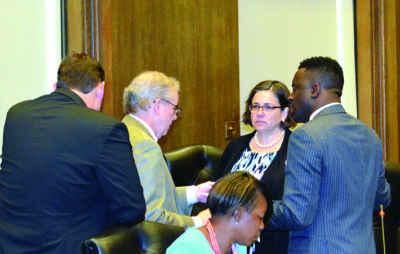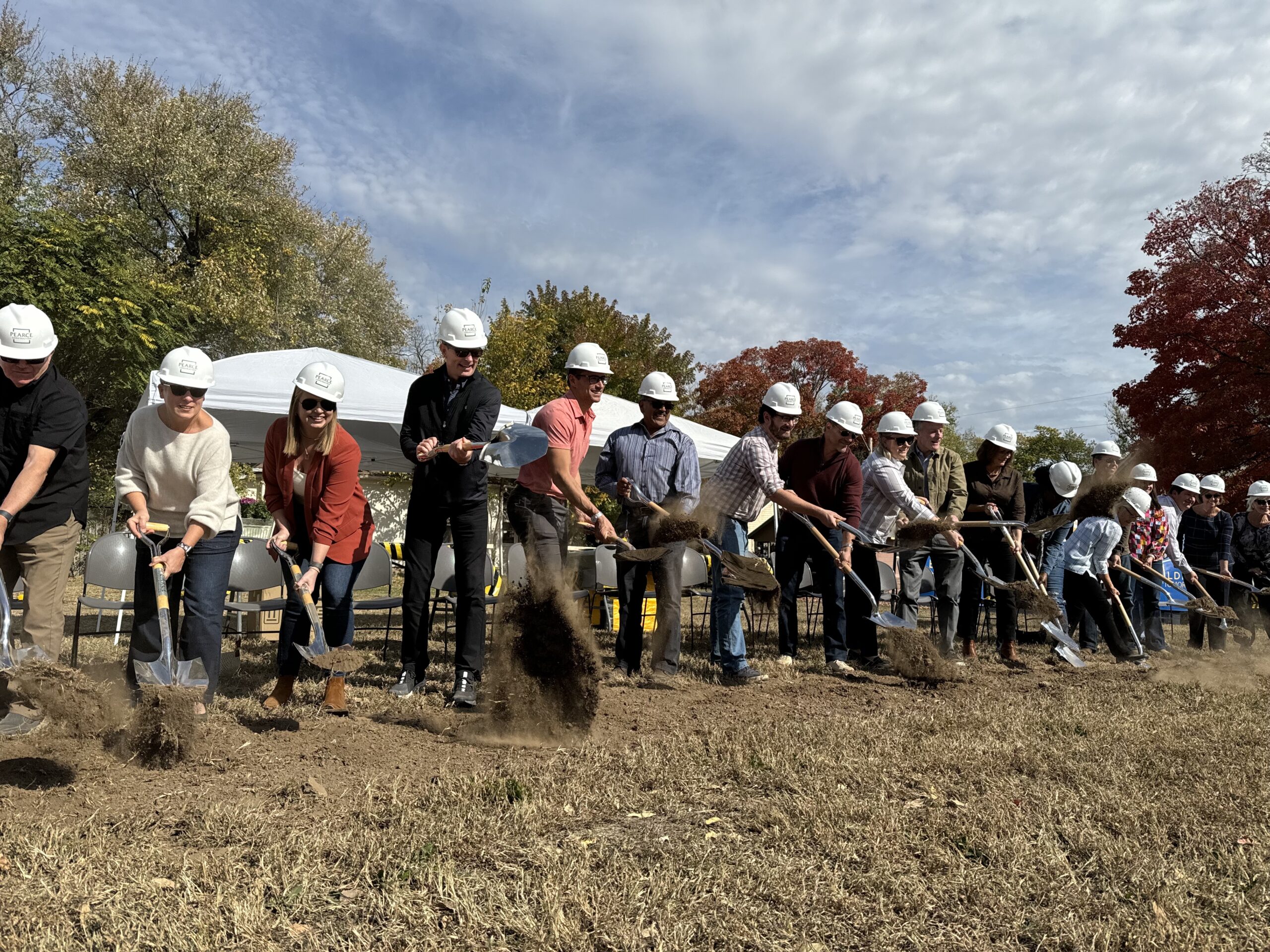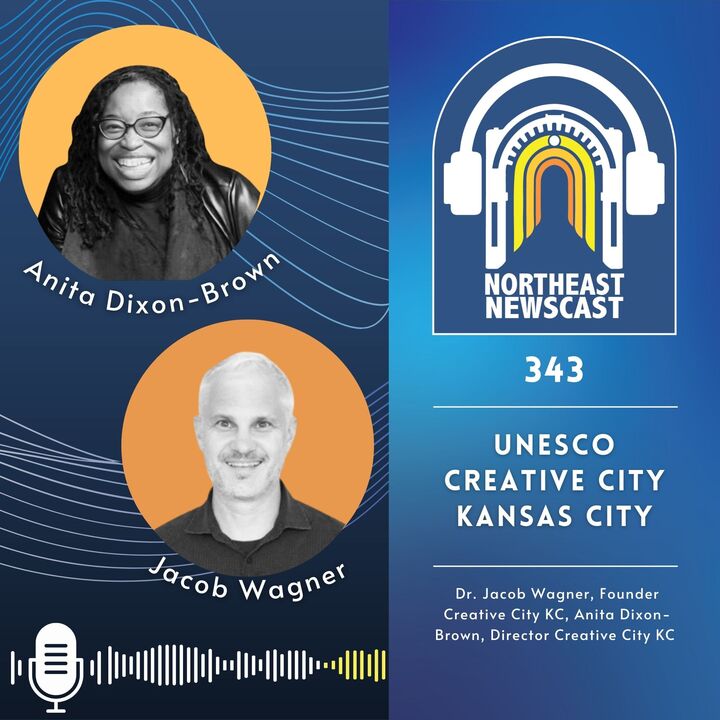By Paul Thompson
Northeast News
Once again, the Kansas City, Missouri City Council has drowned out the noise to reach an agreement on a major decision.
On the morning of Thursday, September 21, a joint Council committee advanced 3rd District Councilman Jermaine Reed’s committee substitute for Ordinance No. 170663 to the full Council. By the body’s 3:00 p.m. legislative session, the substitute was approved by a 10-2 vote of the full council. Fifth District Councilman Lee Barnes and 6th District Councilman Scott Taylor served as the dissenting votes.
 As with previous prolonged debates, such as those regarding 18th and Vine District improvements and General Obligation Bond ballot language, the Council ultimately cobbled together a resolution. But as legal counsel Charles Renner conceded during his September 21 testimony, there was a lot of noise to drown out before the vote.
As with previous prolonged debates, such as those regarding 18th and Vine District improvements and General Obligation Bond ballot language, the Council ultimately cobbled together a resolution. But as legal counsel Charles Renner conceded during his September 21 testimony, there was a lot of noise to drown out before the vote.
The issues started shortly after Burns & McDonnell proposed a plan to privately finance the construction of a new single terminal airport in May of 2017. Public hearings and pointed questions from the Council followed the proposal, which came without a formal bidding process. Over the next several months, Burns & McDonnell’s initial proposal led to a flurry of developments, which included but were not limited to: the hiring of outside counsel for $500,000 to review the proposal; the May 30 decision to open single terminal construction up to a bidding process; a short-lived dalliance with a “Swiss challenge” format that would give Burns & McDonnell the right to match the winning proposal; multiple drafts from the City of a Request for Qualifications/Proposal (RFQ/P); allegations of impropriety from the AECOM-led team after the aforementioned RFQ/P process was extended; allegations of a conflict of interest for 4th District Councilwoman – and Airport Committee chair – Jolie Justus, which were subsequently dismissed; and the disqualification of Burns & McDonnell from consideration for reasons that seemed ambiguous to the general public and members of the City Council alike.
Last week alone, Burns & McDonnell publicly questioned the decision-making process that led to their bid being disqualified, and a bipartisan group of Missouri legislators who represent the Kansas City area penned a letter criticizing the process.
District 17 Senator Ryan Silvey, a Republican, went so far as to question the legality of the Selection Committee’s decision.
“This project is too important to the region for the City Council to rely on a plan that leaves questions as to whether it complies with the Constitution and laws of the State of Missouri,” Silvey said.
Democrat Jason Holsman, a Senator representing District 7, also spoke harshly about the process. In his statement, Holsman offered his full-throated support for defying the recommendation of the Selection Committee to work on a memorandum of understanding (MOU) with Hometown Team leaders Burns & McDonnell.
“There are a handful of engineering firms in all 50 states that are capable of tackling a build project of this size and we are fortunate that one of them calls Kansas City home,” Holsman said. “We should support a plan that locally circulates the economic development investment with engineers who live in our neighborhoods, send their kids to our schools and spend their earnings in our local economy.”
On September 21, several Council members and Mayor Sly James lamented in open session that Burns & McDonnell’s Hometown Team didn’t come away with the Airport Selection Committee’s recommendation.
“I wanted Burns and Mac to get it. They’re one of our best, strongest community partners,” said 2nd District Councilman Dan Fowler. “But I’m also committed to process.”
“We’ve been through it, the selection committee has made a decision,” added James during the joint session, before expressing more direct regret for Burns & McDonnell’s plight during the Council’s full legislative session. “Not everybody has to love it, but we do have to move on.”
Scott Taylor went a step further, delivering an extended monologue during the portion of the joint meeting reserved for public comments. Taylor read from prepared notes, making a final push to re-consider the proposer from hometown firm Burns & McDonnell. He described the selection process as sloppy and relayed anecdotes from constituents who were strongly in favor of Burns & McDonnell’s proposal.
“Did anybody on the selection committee ask that a third-party bond counsel be consulted before Burns & McDonnell was disqualified?” Taylor asked.
After the joint committee advanced the Edgemoor recommendation, 3rd District Councilman Quinton Lucas repeated his persistent concerns with how the process was handled.
“Frankly, I think there is some legal merit to the question of, ‘why the disqualification?,’” Lucas said. “I’m not sure if we’ve answered all of the questions that we needed to today. I hope over the next weeks and months that we take the opportunity to do so.”
Lucas did point out that the Council was able to add specific language related to community benefit agreements – including funding for the Love Thy Neighbor and Shared Success programs – into the ordinance approved by the Council on September 21. The community benefit agreement outlined by the Council would also include alternative transportation for KCI workers, as well as licensed child care, an on-site health clinic, loan and/or grant programs for disadvantaged businesses, and further assurances regarding local workforce goals.
When asked whether the Council would be particularly discerning as the City works to draft an MOU with Edgemoor, though, Lucas expressed skepticism.
“You would think there would be, but there won’t. If I were going to be completely honest with you, that’s why so many of us wanted to work hard up front; because it’s very easy to speak in broad strokes and try to understand things generally,” Lucas said. “It’s much harder when you have a 40-page or 50-page or a 70-page document. It’s very challenging to know every nook and cranny of it, particularly for the non-lawyer, particularly for the non-expert.”
On the other side, Council members expressed satisfaction with the process.
“I am very confident today that we followed this process through,” said Jolie Justus. “I believe without question that we chose the superior proposal between Edgemoor and AECOM.”
Third District Councilman Jermaine Reed agreed, saying the Council had done an exemplary job of staying focused on the task at hand.
“Throughout this process, there has been a lot of static,” said Reed. “The static in the air didn’t distract the process that was clear.”
Ultimately, a vast majority of Council members gritted their teeth and approved the selection committee’s recommendation. After the joint committee meeting, Edgemoor’s Geoff Stricker wasn’t letting the tenor of the Council’s debate dissuade his enthusiasm for the project.
“I appreciated the thorough due diligence that the advisors and the selection committee did on the process. Obviously, this is an important issue for Kansas Citians, so people have very strong views on that,” Stricker said. “I thought it was a very healthy, productive dialogue as to how they went through the selection process and where they ended up.”
Stricker also reiterated Edgemoor’s “open arms” policy as it relates to inviting all local contractors to bid for construction work at the airport.
“Obviously the most critical milestone is the vote on November 7, and folks coming out and understanding the benefits for the community; for job creation, for economic development, and the impact for creating the work force of the future,” Stricker said. “On any construction project, especially one as large as this, almost all of the work is done with local design partners. So we will be bringing in firms all across Kansas City, as we’ve said multiple times.”
The City and the Edgemoor team will now get to work on developing an MOU for the construction project. Kansas City, Missouri voters will have their chance to weigh in on November 7, when the airport issue hits the election ballot.



















